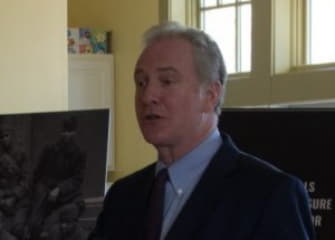
Chris Van Hollen
During World War I, Army Sgt. William Butler charged a squad of Germans and overran their position “single-handedly” with an automatic weapon slung over his shoulder, freeing U.S. prisoners, and “taking some of his own,” according to a local historian.
For the actions of the soldier from Salisbury, Maryland, Butler was awarded the prestigious Croix de Guerre with Palm Award from a French general and the Distinguished Service Cross, was recommended for a Congressional Medal of Honor, and was praised by his commander and peers.
He never received the Medal of Honor for reasons historians believe were racially based, and he died a depressed man by suicide 29 years after coming home, according to Linda Duyer, a Salisbury historian who has studied Butler’s story.
“The more we looked into his heroism and his courage at the time, it became very clear that he was denied because of discrimination at the time, along with many others,” said Sen. Chris Van Hollen, D-Maryland.
On Thursday, Van Hollen, joined by Sens. Roy Blunt, R-Missouri, Tammy Duckworth, D-Illinois, Tim Scott, R-South Carolina, and Richard Blumenthal, D-Connecticut, introduced bipartisan legislation that would help retroactively grant Butler and dozens of other minority World War I veterans the Medal of Honor, the nation’s highest honor.
This is an effort Van Hollen said would “right historic wrongs.”
Rep. French Hill, R-Arkansas, introduced a companion bill in the House.
“The country has to recognize its heroes, even though they are no longer with us, we have an obligation to them and to all veterans to send a clear signal that acts of heroism and bravery will not be overlooked by the country that sent them to battle,“ Van Hollen told Capital News Service.
Van Hollen unveiled the bill in Cambridge to the applause of around 60 Eastern Shore residents, many of whom were veterans of later wars.
Bill Sharpe, a navy veteran from Woolford, Maryland, walked into the event out of pure curiosity, and he left with the impression that the bill is a step in the right direction in ending discrimination.
“Anything that can correct the racism that is in this country . . . I am hoping we can get somewhere, some day where we don’t even know what racism is,” he said.
Michael Foreman, of Snowhill, Maryland, and a commander of the National Association for Black Veterans, celebrated the bill, saying, “Black veterans are finally getting recognized for what they did in the military.”
“It’s been a long time coming,” he added.
Joining the senator on the stage was Army Maj. Gen. (Ret.) Christopher Leins of the Valor Medals Review Task Force, Maryland Secretary of Veterans Affairs George Owings, the chairman of the Maryland WWI Centennial Commission, Joseph Suarez, and the co-chairman of the Valor Medals Review Task Force Research Subcommittee, Dr. Timothy Westcott.
For Duyer, the announcement of the bill that could finally grant the Army sergeant the nation’s highest honor was a victory she had been anticipating for nearly 20 years.
Duyer first encountered Butler’s history in a book about the African American soldiers of World War I.
While reading, she was surprised to come across the town of Salisbury, Maryland, the name of Butler, where she found “a whole section of the book was devoted to his heroism,” and a picture of him printed significantly larger than those of his fellow soldiers.
“When I first read that, I thought, wow who is this person from Salisbury?” she said.
Upon further research, she found, “there were a number of people who got medals … but the men voted and selected Butler to lead the parade” of his New York unit through Harlem after the men returned from deployment.
Duyer kept following the story through Butler’s denied application for a Medal of Honor on to his death, which she believes could be related to his depression after his presumed son, William Butler Jr., died the year before in “an accident by the railroad” while the Army private was stationed in Raleigh, North Carolina.
Since 2015, Duyer has been on a quest, along with a fellow researcher from New York University, Dr. Jeffrey Sammons, to get Butler honored for his service. They previously tried to secure the award through Sen. Ben Cardin’s office, but they said they ran through multiple legislative “roadblocks” until they “hit a brick wall.”
Duyer wanted to give up, but Sammons refused, so he teamed up with a task force from Park University in Missouri to push for bipartisan legislation that would fix the multiple problems in the Department of Defense that they said currently inhibit the retroactive rewarding of the Medal of Honor to World War I vets.
Van Hollen took up the cause.
“The Defense Department needs to be authorized to do this,” he said. “There are deadlines that prevent them from doing this review, and ultimately the work of the commission (that seeks and submits Medal of Honor applications) has to then be reviewed and validated by the Defense Department.”
Van Hollen’s bill would get rid of those deadlines and help ease the process of submitting applications to the commission, as well as require the Department of Defense to take a second look at all minority applications for the nation’s highest award from April 6, 1917, to November 11, 1918, the last day of World War I.


































